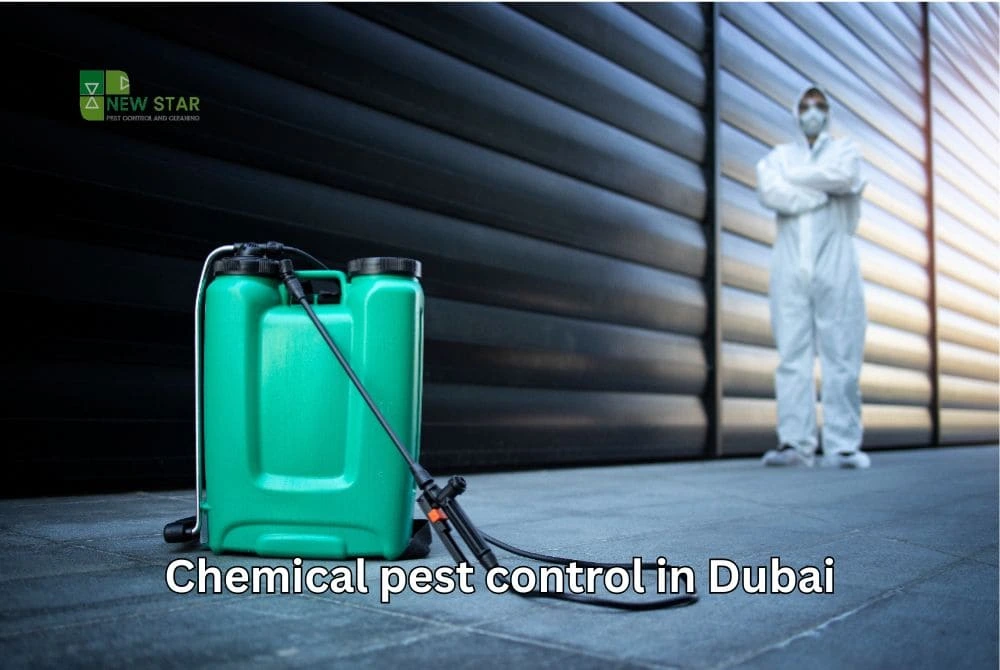Pest infestations can destroy your daily life, damage assets, and pose serious health risks. Among the many pest control methods available, chemical pest control remains one of the most effective and widely used solutions. By leveraging scientifically formulated pesticides, chemical pest control targets a range of pests to provide swift and long-lasting relief. Let’s delve deeper into this approach to understand its workings, benefits, and applications. As the best pest control company in Dubai, we provide detailed information about chemical insect control.
What is Chemical Pest Control?
Chemical pest control involves the use of chemical substances, known as pesticides, to eliminate or manage pests. These chemicals are engineered to disrupt the life cycles of pests, targeting specific species without causing unnecessary harm to the surrounding environment. They can be applied as:
- Sprays: Ideal for open areas and surfaces where pests are visible.
- Powders: Effective in cracks, crevices, and hard-to-reach spaces.
- Gels and Baits: Used to attract and eliminate pests like ants and cockroaches.
- Fumigants: Gaseous chemicals for extensive infestations, particularly termites and bed bugs.
Common Pests Controlled by Chemical Methods
Chemical pest control is versatile and can handle a wide variety of pests, including:
- Insects: Cockroaches, ants, mosquitoes, bed bugs and other small bugs, and flies.
- Rodents: Mice and rats that threaten health and damage property.
- Termites: Silent destroyers of wooden structures and furniture.
- Weeds and Fungi: Especially in gardens and agricultural areas.
Types of Chemicals Used in Pest Control
- Insecticides: Control and eliminate insect populations, including mosquitoes, termites, and cockroaches.
- Rodenticides: Specially designed to tackle rodent infestations effectively.
- Fungicides: Protect plants and buildings from mold and fungal growth.
- Repellents: Prevent pests from entering treated areas without killing them.
- Larvicides: Target the larvae stage of pests like mosquitoes to stop their life cycle.
Benefits of Chemical Pest Control
- Quick Results: Pesticides work rapidly, making chemical control ideal for severe infestations.
- Customizable Treatments: Different chemicals target specific pests, ensuring efficient use.
- Residual Protection: Some chemicals continue to protect the treated area for weeks or months.
- Versatility: Applicable in residential, commercial, and agricultural settings.
- Cost-Effective: Offers long-lasting results, reducing the need for frequent reapplications.
Limitations and Precautions
While chemical pest control is highly effective, it comes with considerations that require careful management:
- Health Risks: Prolonged exposure to certain chemicals can pose health risks if not handled properly.
- Environmental Concerns: Overuse or misuse can harm beneficial insects, plants, and water sources.
- Chemical Resistance: Pests can develop resistance to certain pesticides, reducing effectiveness.
To mitigate these risks, it’s essential to:
- Hire professional pest control services for proper application.
- Follow product instructions and safety guidelines.
- Opt for eco-friendly and less toxic options whenever possible.
Chemical Pest Control Process
- Inspection: Experts assess the extent of the infestation and identify the pest species.
- Selection: Suitable chemicals are chosen based on the type of pest and severity.
- Application: Chemicals are applied using appropriate techniques, ensuring minimal disruption.
- Follow-Up: Regular monitoring ensures the treatment remains effective and addresses any residual pests.
Eco-Friendly Alternatives in Chemical Pest Manage
Modern pest control has evolved to incorporate safer, eco-friendly solutions that minimize harm to the environment. These include:
- Biopesticides: Derived from natural materials like plants, bacteria, and certain minerals.
- Integrated Pest Management (IPM): Combines chemical, biological, and mechanical methods for comprehensive control.
- Targeted Application: Chemicals should be used only in affected areas to reduce overall exposure.
Why Choose New Star for Chemical Pest Control in UAE?
At New Star Pest Control, we specialize in delivering effective and safe chemical services across Dubai, Sharjah, Ajman, and the UAE. Here’s why we are the preferred choice:
- Expert Team: Our trained professionals have extensive experience handling a wide variety of infestations.
- Eco-Friendly Approach: We prioritize the safety of your family and the environment by using certified, non-toxic chemicals.
- Tailored Solutions: Every home or business is unique, and we customize our services to meet your specific needs.
- Proven Results: Over a decade of experience ensures long-lasting protection and customer satisfaction.
Tips for Homeowners Post-Treatment
To maximize the effectiveness of chemical pest control:
- Avoid cleaning treated areas for a few days unless instructed otherwise.
- Seal cracks and entry points to prevent re-infestation.
- Keep food items sealed and stored properly.
- Regularly inspect for signs of new pest activity.
- Schedule routine pest control treatments for ongoing protection.
Conclusion
Chemical pest manage remains one of the most effective methods for managing pest infestations in residential and commercial spaces. When handled professionally, it ensures quick, reliable, and long-lasting results, making your home or business pest-free and comfortable.
If you’re dealing with a pest problem, New Star Pest Control is your trusted partner for safe and effective chemical pest control in the UAE. Contact us today to schedule your service and reclaim your space from unwanted intruders!

